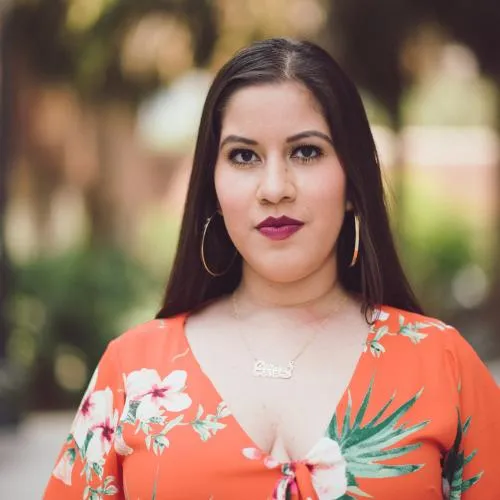
This program will last about 45 minutes without intermission.
Program
Daniel Catán
Escúchame from
Florencia en el Amazonas
Alberto Ginastera
Cinco canciones
populares Argentinas
Chacarera
Triste
Zamba
Arroró
Gato
Jaime León
Rima
A ti
La casa del lucero
Algun día
Ernesto Lecuona
Por eso te quiero
Noche azul
Siboney
María Grever
Cuando vuelva a tu lado
Te quiero, dijiste
Júrame
Gonzalo Roig
Salida de Cecilia from Cecilia Valdés
About the Program
Program Notes by Mark Bilyeu.
Daniel Catán
Escúchame from Florencia en el Amazonas
Born April 3, 1949, Mexico City, Mexico
Died April 9, 2011, South Pasadena, California
Premiered October 26, 1996, Houston Grand Opera
In 1996, Mexican composer Daniel Catán was jointly commissioned by Houston Grand Opera, Los Angeles Opera, and Seattle Opera to craft what would be the first Spanish-language opera commissioned by American opera houses. Florencia en el Amazonas, with a libretto by Marcela Fuentes-Berain – a pupil of Gabriel García Márquez, the leading figure in magical realism – tells the story of famous recluse opera singer Florencia Grimaldi. The soprano travels incognito down the Amazon, en route to the city of Manaus, where her fellow travelers are hoping to see the elusive diva perform. Grimaldi, however, is seeking her lost lover, Cristóbal, whose love had unlocked her superhuman musical abilities. As they make their way down the river, a storm causes the boat to run ashore. As they finally draw near to their destination, the passengers, entangled in their own complicated lives, realize that Grimaldi is on the ship with them. Finding out the city of Manaus has been decimated by cholera, they decide to not disembark, and the heroine sings this lament for her beloved Cristóbal, knowing he is present in the wind, in the water, and in her song.
Alberto Ginastera
Cinco canciones populares Argentinas
Born April 11, 1916, Buenos Aires, Argentina
Died June 25, 1983, Geneva Switzerland
Composed 1943
Composer Alberto Ginastera divided his own artistic output into three distinct time periods: Objective Nationalism (1934 –1948), Subjective Nationalism (1948 –1958), and Neo-Expressionism (1958 –1983). It was toward the end of this first period—a time of his unabashed national pride—that a militant revolution was occurring in Argentina. This revolution, as Aaron Copland observed, allowed musical policy to be dictated by “a small group of conservative musicians” (this aligns with the crackdown on the musical output with the Soviet regime). Ginastera, inspired by Béla Bartok’s bold move to publish his own Hungarian Folksong in his communist country, set out to publish his own set of Argentine songs. These songs—unusually sparse, poly-rhythmic, and tinged with harmonic dissonance—offer opportunities for displays of technical prowess for the pianist, and long-spun intimate lines for the singer. The 27 year old Ginastera took inspiration from common folks songs as he crafted melodies that are familiar, but not always traditional. While it was Ginastera’s public stance against the political leadership which would eventually make him a target and cause his dismissal from his teaching positions at state-run institutions, it was his deep love for his country that gifted us these songs.
Jamie León
Rima | A ti | La casa del Lucero | Algum día
Born December 18, 1921, Cartagena de Indias, Colombia
Died May 11, 2015, Bogotá, Columbia
Colombian pianist and composer Jamie León wrote a total of 43 songs, often setting the poets of his generation, including Dora Castellanos and Eduardo Carranza. His compositional style incorporates aspects of his Colombian heritage with that of American jazz and musical theater. After completing studies at the Juilliard School in piano, conducting, and composition, León pursued a career as a conductor with the National Symphony Orchestra of Colombia, the American Ballet Theater Orchestra, and the Philharmonic Orchestra of Bogotá. In 1988, he was awarded Columbia’s Order of Artistic Merit.
Ernesto Lecuona
Por eso te quiero | Noche azul | Siboney
Born August 7, 1895, Havana, Cuba
Died November 29, 1963, Canary Islands
Ernesto Lecuona’s works have become ubiquitous with the Cuban music craze of the 1930’s and 40’s. Born in Havana, he studied piano with his sister, Ernestina, who was a lauded composer and pianist, until he moved to continue his studies with Joaquín Nin at the Peyrellade Conservatory. At the age of 20, he gave his New York City debut recital at the Aeolian Hall. His songs feature not only the Afro-Cuban and Cuban rhythms that permeated his childhood, but also a lush romantic harmonic texture, and full, sonorous accompaniments. Like others on this program, he wrote for a booming film industry; his credits included the films The Cuban Love Song, Always in My Heart, and One More Tomorrow, and the entire musical score of the film Carnival in Costa Rica. Although “Siboney” might be his most recognizable tune, his music deserves a much deeper look than this one hit. In 1985, Placido Domingo received a Grammy for his album of Lecuona’s songs, Siempre en Mi Corazón — Always in My Heart: The Songs of Ernesto Lecuona, but this annotator recommends the recordings of the composer playing solo piano versions his own works, or accompanying his fellow Cuban, the tenor Mariano Meléndez.
María Grever
Cuando vuelva a tu lado | Te quiero, dijiste | Júrame
Born September 14, 1885, Leon, Mexico
Died December 15, 1951, New York, New York
Once called “the busiest woman in all New York” by The Brooklyn Daily Eagle, Maria Grever might not be a familiar name to many. Born to Mexican and Spanish parents, she was identified as a prodigy, and went on to study with Claude Debussy and Franz Lehar (two very different musical influences!). She built a career for herself in Mexico, writing some music while raising her two children with her husband, an American businessman. At the age of 31, she took her two children and moved to New York city—a radical thing for a woman to do in 1916. She began performing in New York, but never played her own songs. Until G. Schirmer publishers picked up her bolero “Júrame” in 1926. The next year, the Mexican tenor Jose Mojica released a recording of “Júrame,” which made Maria Grever a household name. She continued to write over 800 songs (some accounts say nearly a thousand) which would go on to be used in films, and sung by the biggest stars of the day including Bing Crosby’s version of "Cuando Vuelva A Tu Lado” (“What a Difference a Day Makes”), and her 1944 lullaby “Te Quiero Dijiste,” which was used in the film Bathing Beauty starring Red Skelton and Ester Williams (though that was also renamed as Magic is the Moonlight for English audiences). Maria Grever remained active until her death in 1951 and in 1952 was declared Woman of the Americas by the Union of Women of the Americas.
Gonzalo Roig
Salida de Cecilia from Cecilia Valdés
Born July 20, 1890, Havana, Cuba
Died June 13, 1970, Havana, cuba
Composed 1931
Premiered 1932, Havana, Cuba
Gonzalo Roig is one of Cuba’s most prominent musicians, having founded both Havana’s National Opera and its Philharmonic Orchestra. Trained as both a pianist and violinist, the young musician toured throughout his homeland, while also composing. His first big hit "Quiéreme mucho," came at the age of 21. He later sold the rights to the song, and the (totally re-written) English version was made famous by the Tommy Dorsey Orchestra in 1941. His zarzuela—a Spanish language dramatic work that incorporates spoken dialogue alongside both operatic and popular songs—Cecilia Valdés first premiered in Havana in 1932 and became his calling card. The work's plot (based on a famous novel by Roig's countryman, Cirilo Villaverde), introduces us to the titulature heroine: the illegitimate daughter of a wealthy Spaniard, who falls in love with a nobleman. When he leaves her for another woman, Cecilia hatches a plot to have him killed. Here, though, in her entrance number, “Salida de Cecilia,” we are blissfully unaware of the conflict, and can simply enjoy the music.
Translations
Escúchame from
Florencia en el Amazonas
Hear me
Where are you, Cristóbal?
Did I come all this way just to lose you again?
Has the voracious jungle taken you
from me once more? Why do I feel you close?
Hear me, Cristóbal
My voice soars toward you
Like a bird and spreads its wings
Sheltering the world’s love
My voice was born in you
From your hands
Which asleep or awake
Dream of wondrous butterflies
I know you can hear me
Because my song soars high
If you weren’t here to cherish it
My voice would not glide
My song is born in you
Because of you it can cross
The turbulent waters of the morning
Or the still river of the night
And there, on the other bank
Stop to listen
To its own fluid murmur
I know that you hear me
In life or in death
If you were not listening
My song would cease
I hear the beating of your heart
In the wings
Of every butterfly
In every green splendor
In the wind
In the water
In the depths of the jungle
In life or in death
I hear your pulse
In my song’s soaring flight
In the soothing skies
I feel you
In the air
Cristóbal! Cristóbal!
I feel the beating of your heart
In the gentle air
Of my song
Here, here, here...
In my song.
Works by Jaime León
translations © Liliana Guerrero, used by permission
Rhyme
I cannot tell you
with silence,
nor with words,
not even with the most
desperate music.
Maybe with the moon
or with the smell
of violets, humid
with wine and music,
suffering, nocturnal.
Maybe in the evening,
when there is only
a rumor of leaves
with wind and stars
while you lie awake.
Maybe with the moon,
if the moon could smell
of wine and violets
Maybe with nocturnal words,
and if the words could see.
I cannot tell you.
To you
You don‘t know… but I have dreamed
in my dreams the color of ermine,
delightful hours of your love
ardent kisses, soft sighs
when the afternoon tinges with gold
those spaces that we saw together,
when my soul takes flight
to the regions of the infinite.
The house of the bright star
The afternoon lives on a bright star,
there the violets surround its house,
and all around languid angels
make a serene valley with their gaze.
In this valley are the hills
clouds of gold, clouds of gold;
and from the depths sounds a music,
the Milky Way, distant river.
Everyday it comes to the earth
to look at you, sleeping boy;
it descends to your street by the staircase
of a verse of mine.
It enters your house, awakened boy,
it becomes part of your dream sleeping boy, and, sighing, it will take
the last train to a bright star.
One day
One day you will arrive;
love is waiting for us
and you will say to me:
My love, spring has arrived.
One day you will love me.
You will be so close to my bosom,
that I will not know if the fire that burns me
is of your heart or of the summer.
One day you will have me.
Silently we will listen
to the pulsing of our veins
the sob of the naked trees.
One day. Any day.
Brief and eternal,
love is the same
in summer, in fall and in winter.
Works by Ernesto Lecuona
translations © Liliana Guerrero, used by permission.
That’s why I love you
I love you for your rosy face,
I love you for your divine eyes,
I love you because I know that you cried
in the days of my absence, of sad solitude.
I love you because you are more than saintly,
I love you because you are my happiness,
I love you because I know that you adore me,
I love you, I will love you until I die.
Blue Night
Blue night, that saw my spirit glow
With the passion of treasured dreams,
Come to me again and bring peace to my heart. Can’t you see that I’m dying of love?
Come blue night, come once more
And show me your light.
See, it is my heart that is so eager to love.
Come once more, for without you
I take no pleasure in the delights of love.
Come, or I will die of love.
Siboney
Siboney, I love you,
I would die for your love.
Siboney, your lips
Are as sweet as honey.
Come to me, because I love you
And you are a treasure to me.
Siboney, the sweet lullaby of the palms makes me think of you.
Siboney, you are in my dreams
when you are not near.
Siboney, if you don’t come to me,
I will die brokenhearted.
Siboney of my dreams,
I will await you anxiously in my hut,
Because you are my dream
Of love, Siboney.
Hear the echo of my tender cry.
Dont get lost on your way through the jungle.
Works by María Grever
translations © Amy Cachola, used by permission.
When I return to your side
Remember that kiss
That you jokingly denied me,
It escaped from your lips without wanting to.
And scared by it, I seek shelter
In the immense bitterness of my being.
When I return to your side
Do not deny me your kisses
The love that I have given you,
You will not be able to forget.
Don’t ask me anything,
I have nothing to explain to you.
The kiss that you denied
You are unable to give.
When I return to your side
And you are alone with me,
The things that I tell you,
Never repeat out of compassion.
Join your lips to mine
And hold me in your arms
And count the beating of our heart.
I love you, you said
“I love you,” you said.
Taking my hands into your hands
Of white ivory.
And I felt in my chest
A strong pulse, afterwards a sigh,
And later a click of a fevered kiss.
Beautiful little doll,
With golden hair,
With teeth of pearls,
Ruby lips.
Tell me if you love me like I adore you.
If you remember me like I remember you.A
And sometimes I hear a divine echo,
That comes in with the breeze
Seeming to say:
“Yes I love you,
Very, very much.”
So much so,
That I will love you until death.
Promise me
Everyone says it is a lie that I love you,
Because they have never seen me in love.
I swear to you that I also don’t understand
The reason I am fascinated with your gaze.
When you are close to me and you are happy
I don’t want you to remember anyone else.
I am jealous at the mere thought
Of you loving someone else.
Swear to me that however much time passes
You will not forget the moment
I first met you.
Look at me, there is nothing more profound
Or greater on this earth
Than the affection I give you.
Kiss me with a passionate kiss
Like no one else has ever kissed me
Since the day I was born.
Want me, want me insanely
Until you know the bitterness
That I am suffering for you.
Cecilia Valdés from Salida de Cecilia
by Gonzalo Roig
translation © Liliana Guerrero, used by permission.
Cecilia’s exit
Yes, I am Cecilia Valdés!
I am Cecilia, Cecilia Valdés.
The blood boils in my veins,
I am mestiza, and I am not.
I don’t know of sorrow,
I always go along singing.
I feel in my Cuban soul
The joy of living.
I am a rattlesnake, I am a bell.
I don’t know what it is to suffer.
My loves are the flowers
That perfume my garden
And my crystalline laugh
It is an eternal tin tin.
There is not in my garden
A single flower
That is not a flower of love.
And the men always
Go after me
Breathing in the rich scent of the flower.
Ah!
Cecilia Valdés they call me,
I fell in love with a bachelor
My friends claim me
And I must have something.
I am a fine dancer,
I’m dancing the best
Dancing fascinates me
I am dancing the best.
My name is Cecilia Valdés
Harbinger of joy,
I sing and dance a porfía
I am Cecilia Valdés!
About The Artists
Lilian Guerero

Dr. Liliana Guerrero is Assistant Professor of Voice at the Butler School of Music, where she teaches Vocal Pedagogy and Applied Voice.
The daughter of Mexican and Cuban immigrants, her research focuses on advocating for Latin-American voices in classical music and she has received fellowship funding for this from the Society for American Music. She is a frequent lecturer and panelist on the topic of diversity, equity, and inclusion in the voice studio and serves as a member of the NATS DEI Task Force as well as the organizer for the NATS Latinx/Hispanic Teachers Affinity Group. She is a previous Faculty-First Look Fellow at NYU Steinhardt and a Future of Music Faculty Fellow at Cleveland Institute of Music. With a passion for community outreach, Guerrero serves as a Teaching Artist for Austin Opera, Membership Liaison for South Texas NATS, and Webmaster for Texoma NATS. Guerrero is also part of the founding committee for the Ibero-American Chapter of NATS and spends summers on the voice faculty of the Atlantic Music Festival.
As a soprano, Dr. Guerrero has performed operatic repertoire all over the United States and Europe. Her competition prizes include awards from the Metropolitan Opera National Council Auditions, National Opera Association, Opera Grand Rapids Vocal Competition, Naftzger Young Artist Competition, NATS Artist Awards, Gilbert & Sullivan Society of Houston Competition, Bel Canto Foundation, and two artist grants from the Koch Cultural Trust.
A proponent of singing and teaching all vocal styles, Guerrero completed the Contemporary Commercial Music Vocal Pedagogy Institute at Shenandoah Conservatory as well as Level 1 of LoVetri Somatic Voicework™. Guerrero was also selected as a 2021 NATS Intern. She is a member of the National Association for Teachers of Singing, Pan American Vocology Association, National Opera Association, Opera America, and National Association of Latino Arts and Culture.
James Maverick

Pianist James Maverick joined the University of Texas at Austin’s Butler School of Music in 2021, where he teaches vocal repertoire and accompanying. He has worked as music staff at Cincinnati Opera, where he was pianist and assistant chorus master for Rossini's Il barbiere di Siviglia, Bizet's Carmen, and Puccini's Tosca, and Opera Philadelphia, where he prepared a workshop for the upcoming premiere of Jennifer Higdon's Woman with Eyes Closed. He was a Resident Artist at the Lyric Opera of Kansas City, where he assisted in the preparation of nine opera productions, including serving as chorus master for Bizet's Les pêcheurs de perles. He has been a coach on the faculty of the University of Missouri-Kansas City, and has also served as the official accompanist for the Kansas City district of the Metropolitan Opera National Council Auditions. He has been a fellow at the Tanglewood Music Center and an apprentice coach at the Merola Opera Program and Wolf Trap Opera. A native of Baton Rouge, Louisiana, he received a B.A.in economics and B.M. in piano performance from Lawrence University, where he studied with Michael Mizrahi, and he received an M.M. in piano and choral conducting and Performer Diploma in collaborative piano from Indiana University, where his teachers included Emile Naoumoff, Kevin Murphy, Anne Epperson, Walter Huff, Betsy Burleigh, and Dominick DiOrio.
Upcoming Events

Butler School of Music Presents
Les Noces
By Igor Stravisnky
and Ballet Mécanique by Geroge Antheil
FEATURING
Experimental & Electronic Music Studio
Concert Chorale
Percussion Ensemble
Patti Wolf, Rick Rowley, & Andrew Brownell, piano
Leah Crocetto, soprano
Page Stephens, mezzo soprano
Evan Brown, tenor
Mikhail Smigelski, bass
Thursday, October 17, 7:30 p.m.
Bates Recital Hall
Butler Opera Center Presents
La Traviata
by Giuseppe Verdi
October 18 & 25, 7:30 p.m.
October 20 & 227, 4:00 p.m.
McCullough Theatre
Concert Chorale
Sunday, November 5, 4:00 p.m.
Bates Recital Hall
Butler Opera Center Presents
Song Reimagined Series: The Shards of Love
Friday, November 8, 7:30 p.m.
McCullough Theatre
Donnie Ray Albert, baritone
Celebrating 50 Years of Performing
Thursday, February 27, 7:30 p.m.
Bates Recital Hall
Event Details
$10–20 All University of Texas at Austin students are allowed one free ticket as long as they are available. Student tickets must be picked up at the Box Office with valid student I.D. Seating is unassigned.
If you are a patron with ADA needs, please email tickets@mail.music.utexas.edu and we will reserve ADA seating for you.

